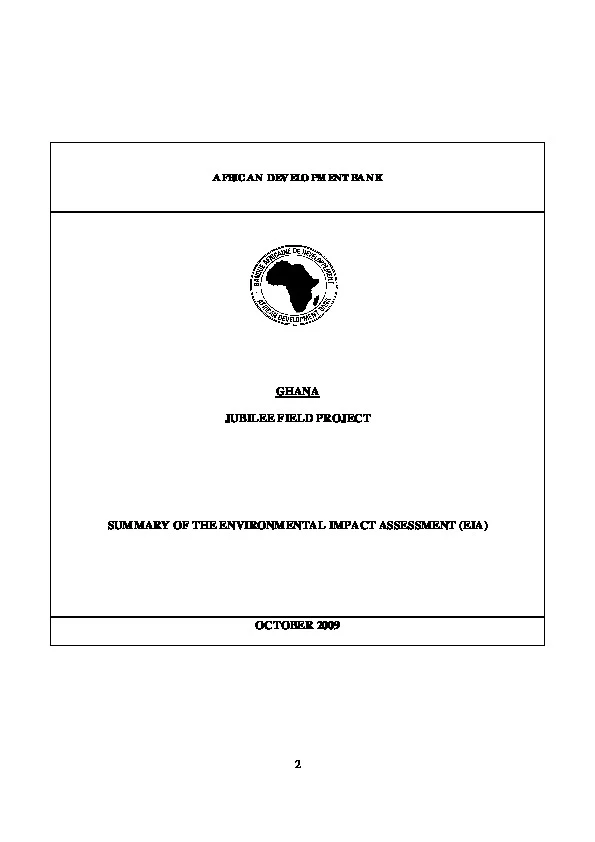African Development Bank: Ghana Jubilee Field Project
Add bookmark
This 37 page white paper covers the Ghana Jubilee Field project and the Summary Of The Environmental Impact Assessment
The African Development Bank (AfDB) will be providing funding to a consortium led byMODEC, who are a sub-contractor to the Jubilee Joint Venture (described below), for the provision of the FPSO under a lease-operate arrangement. Tullow Ghana Limited (Tullow) and its joint venture partners Kosmos Ghana HC (Kosmos), Anadarko WCTP Company, Sabre Oil and Gas, the EO Group, and the Ghana National Petroleum Corporation (GNPC), known as the Jubilee Joint Venture, are pursuing development of hydrocarbon resources within the Jubilee Field, which is located in deep water approximately 60 km offshore Ghana from the nearest coast and lies in deep water of 1100 – 1700 meters.
The two concession blocks are operated by Tullow Ghana Ltd (Tullow) and Kosmos Energy (Kosmos), respectively. Under a Unitization (combining of multiple wells to produce from a specified reservoir) agreement Tullow has been designated as Unit Operator of the Jubilee Field Unit on behalf of the Jubilee Joint Venture parties. The management of the facilities project design and execution to be deployed in field is being lead by Kosmos Energy as Technical Operator.
The Jubilee Joint Venture is planning a multi-phase development of the Jubilee Field. Phase 1of the development including a Floating Production Storage and Offloading (FPSO) vessel is thesubject of this Environmental Impact Assessment (EIA- also equivalent to an Environmental and Social Impact Assessment or ESIA).
The proposed project would be the first major deepwater offshore oil production project in Ghana and for projects of this type there is a legislative requirement to undertake an EIA. The regulatory requirements for an FPSO are generally set out by the coastal state, international conventions, and the classification society (naval architecture, private organizations which issue rules for the construction). An FPSO therefore needs to satisfy all of the requirements from these authorities.
The EIA of the project has been prepared by Environmental Resources Management (ERM) and ESL Consulting (ESL), jointly referred to as the EIA team, and was appointed by Tullow in 2008 to undertake an EIA for the Phase I Development project. The EIA team comprises independent environmental and social specialists with experience in undertaking EIAs for similar projects in other countries and EIA experience in Ghana.
In addition, a series of studies have been undertaken by specialist consultancies to address specific issues such as an oil spill simulation model. The EIA was carried out with input from specialists from the Jubilee Joint Venture team. Input included providing details on the project’s technical aspects as well as with the development of mitigation measures and environmental management plans.
The purpose of the EIA is to provide information to regulators, the public and other stakeholders (a total of 31 meetings involving approximately 2,500 people were held at national, regional, district and local levels during the EIA phase between February and September 2009) to aid in the decision making process. In accordance with Ghana EIA requirements, the draft EIA was advertised and made available for public review and comments.
Comments received on the draft EIA from the technical review of Environmental Protection Agency (EPA) of Ghana, stakeholders written comments, and the outcome of any public hearings that were held, will be incorporated into the final report which will be submitted to the EPA for final review and approval.





















